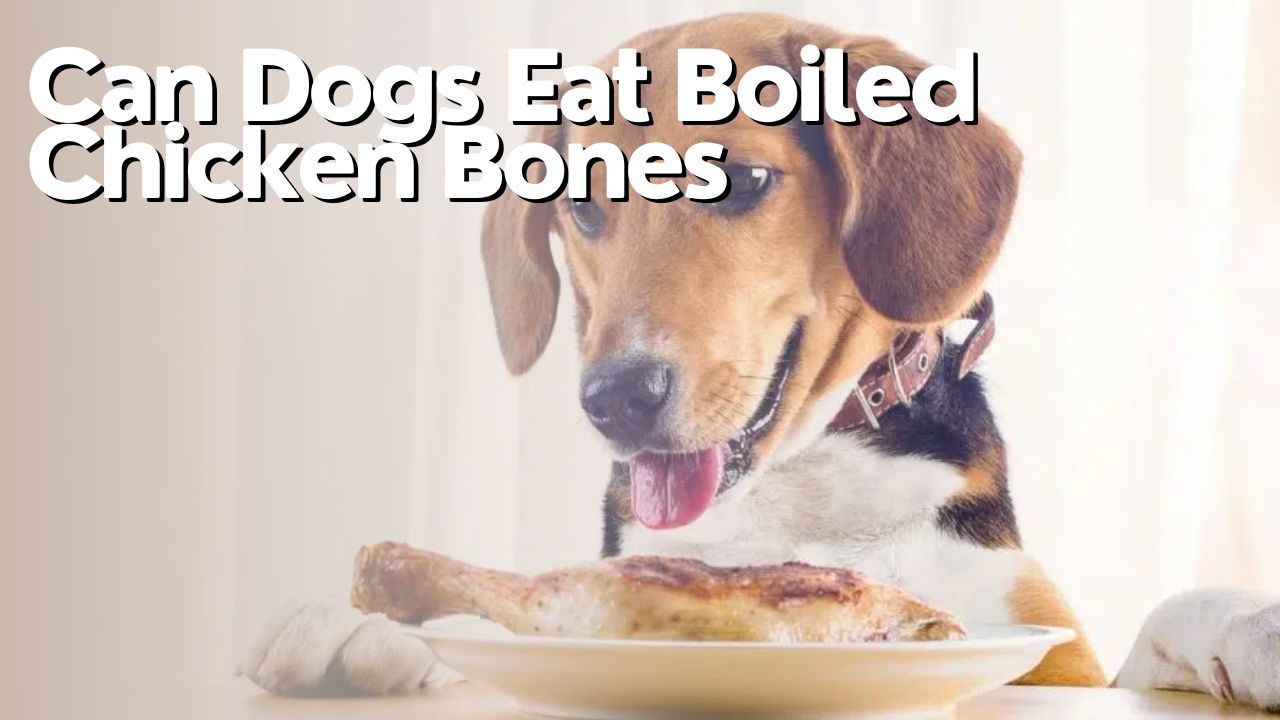Hey there dog lovers!
Have you ever wondered if it’s safe to give your furry friend boiled chicken bones?
Well, in this article, we’re going to dive into the risks and potential dangers associated with feeding dogs cooked bones.
We’ll also explore alternative options and expert opinions on the matter.
So, if you want to make an informed decision about what to feed your canine companion, keep reading to find out more!
- The Risks of Feeding Boiled Chicken Bones to Dogs
- Understanding the Anatomy of Dogs' Digestive System
- Potential Dangers of Cooked Bones
- Alternatives to Feeding Boiled Chicken Bones
- Expert Opinions on the Safety of Cooked Bones
- Signs of Bone-Related Issues in Dogs
- How to Safely Prepare Chicken for Your Dog
- Nutritional Benefits of Chicken for Dogs
- Safe and Healthy Treat Options for Dogs
- Making an Informed Decision for Your Canine Companion
- Frequently Asked Questions
- Conclusion
The Risks of Feeding Boiled Chicken Bones to Dogs
You shouldn’t feed your dog boiled chicken bones because they can pose serious risks to their health. While it may seem like a harmless treat, there are several dangers associated with giving your dog boiled chicken bones.
One of the main concerns is the risk of bone splintering. Boiled chicken bones can easily break apart into sharp shards, which can cause serious damage to your dog’s mouth, throat, and digestive tract. These sharp fragments can puncture their organs, leading to internal injuries that may require surgery to fix.
Another risk of feeding boiled chicken bones to dogs is the potential for choking. Dogs have a natural instinct to chew on bones, but boiled chicken bones can be brittle and easily get lodged in their throat. This can obstruct their airway, making it difficult for them to breathe. If not treated immediately, choking can be life-threatening for your furry friend.
In addition to the physical dangers, boiled chicken bones can also cause digestive issues for dogs. The bones can become stuck in their intestines, leading to blockages that can cause pain, vomiting, and diarrhea. These symptoms can be uncomfortable for your dog and may require medical intervention to resolve.
Overall, it is best to avoid feeding your dog boiled chicken bones to ensure their safety and well-being. There are plenty of other safe and healthy treats available that you can give to your furry friend instead.

Understanding the Anatomy of Dogs’ Digestive System
Understanding the anatomy of a dog’s digestive system can provide insight into their ability to process certain foods. Dogs have a relatively short digestive tract compared to humans, which means that food moves through their system quickly. This short digestive tract is designed for processing a diet that is high in protein, like the one dogs would have in the wild. However, it also means that certain foods, like boiled chicken bones, can pose a risk to their digestive health.
Here are three key points to consider when understanding a dog’s digestive system:
- Dogs have strong stomach acids that help break down and digest food. This is important for processing raw meat and bones, but it can also lead to the splintering of boiled chicken bones, which can cause choking or internal injuries.
- The lack of molars in a dog’s mouth means that they don’t chew their food as thoroughly as humans do. This increases the risk of larger pieces of boiled chicken bones getting stuck in their throat or digestive tract.
- Dogs have a relatively short small intestine compared to humans, which means there is less time for proper absorption of nutrients. This can further increase the risk of complications if boiled chicken bones are ingested.
Understanding these factors can help pet owners make informed decisions about what foods are safe to feed their dogs. It’s important to remember that while boiled chicken itself can be a healthy addition to a dog’s diet, the bones should always be avoided to prevent potential health issues.
Potential Dangers of Cooked Bones
The potential dangers of cooked bones include splintering and causing choking or internal injuries. When bones are cooked, they become more brittle and prone to breaking into sharp pieces. These sharp fragments can easily splinter and cause harm to a dog’s digestive system. If a dog swallows a piece of a cooked bone, it can get lodged in their throat, leading to choking.
Even if the bone is able to pass through the throat, it can still cause internal injuries as it moves through the digestive tract. The sharp edges of the bone can scrape and tear the delicate tissues of the esophagus, stomach, and intestines, potentially leading to severe pain, bleeding, or even perforation of the organs.
Additionally, cooked bones can pose a risk of bacterial contamination. Cooking does not sterilize bones, so there is a chance of harmful bacteria such as salmonella or E. coli being present on the bone, which can cause food poisoning in dogs.
Therefore, it is important to never feed dogs cooked bones to ensure their safety and well-being.
Alternatives to Feeding Boiled Chicken Bones
Consider giving your furry friend other safe and healthy options instead of boiled chicken bones. While it may be tempting to share your meal with your dog, feeding them cooked bones can pose serious risks to their health. Fortunately, there are plenty of alternatives that can satisfy your dog’s cravings without putting them in danger.
Here are some safe and healthy options you can offer your dog instead:
- Rawhide chews: These treats are specifically designed for dogs and can help satisfy their natural urge to chew. Look for high-quality, natural rawhide chews that are made from a single ingredient and don’t contain any additives or preservatives.
- Dental treats: Not only do dental treats provide a tasty snack for your pup, but they also help promote good oral hygiene. Look for dental treats that are designed to reduce tartar and plaque buildup, helping to keep your dog’s teeth clean and healthy.
- Kong toys: Kong toys are a great way to keep your dog entertained and mentally stimulated. Fill a Kong toy with a healthy treat, such as peanut butter or yogurt, and watch as your pup spends hours trying to get to the tasty reward.
By offering your dog these alternatives, you can keep them safe and satisfied without the risks associated with feeding them boiled chicken bones. Remember, your dog’s health and well-being should always be a top priority.
Expert Opinions on the Safety of Cooked Bones
To determine the safety of feeding your furry friend cooked bones, experts recommend seeking their professional opinion. Many veterinarians and animal experts advise against feeding dogs any type of cooked bones, including boiled chicken bones. Cooked bones can splinter and cause serious injuries to your dog’s digestive system, mouth, throat, and even their internal organs. The process of cooking makes the bones more brittle and prone to breaking into sharp pieces. These sharp fragments can cause choking, blockages, or punctures in the digestive tract.
While some people argue that boiled chicken bones are safe because they are softer and less likely to splinter, the general consensus among experts is to err on the side of caution and avoid feeding any type of cooked bones to dogs. Instead, they recommend providing safer alternatives such as raw bones, specially-designed dog treats, or commercial dog food that contains bone meal for the necessary calcium and other nutrients.
Ultimately, it is crucial to prioritize your dog’s safety and well-being. Consulting with a veterinarian or animal nutritionist is the best way to ensure you are making informed decisions about your dog’s diet. They can provide personalized advice based on factors such as your dog’s age, breed, size, and overall health.
Signs of Bone-Related Issues in Dogs
If you notice any signs of bone-related issues in your furry friend, such as difficulty chewing or swallowing, it is important to seek veterinary attention.
Dogs can experience a range of problems when it comes to bones, especially if they are cooked. Cooked bones can splinter easily and cause internal damage to your dog’s digestive system. This can result in serious health issues, such as blockages or punctures.
Here are three signs that may indicate bone-related problems in your dog:
- Excessive drooling: If you notice your dog drooling more than usual, it could be a sign that they have a bone stuck in their throat or esophagus. This can cause discomfort and difficulty swallowing.
- Vomiting or diarrhea: Digestive issues like vomiting or diarrhea can occur when a bone fragments or irritates the lining of the stomach or intestines. These symptoms should not be ignored and should prompt a visit to the vet.
- Lethargy or decreased appetite: If your dog is not their usual energetic self and shows a lack of interest in food, it could be a sign that they are experiencing pain or discomfort from a bone-related issue.
Remember, it’s always better to be safe than sorry when it comes to your dog’s health. If you suspect any bone-related issues, don’t hesitate to reach out to your veterinarian for guidance and assistance.
How to Safely Prepare Chicken for Your Dog
When preparing chicken for your pup, it’s important to ensure it is cooked thoroughly and bone-free. This is because cooked chicken bones can pose a serious risk to dogs. While boiled chicken bones may seem safer than other types of bones, they can still splinter and cause harm to your furry friend’s digestive system.
To safely prepare chicken for your dog, start by removing all bones from the meat. Make sure to check for any small bones that may be hidden, as dogs can easily choke on them. Once the chicken is bone-free, you can proceed with cooking it. Boiling chicken is a great option as it helps to retain the nutrients and flavor.
To boil chicken, simply place the boneless pieces in a pot of water and bring it to a boil. Reduce the heat and let it simmer until the chicken is fully cooked. It’s important to cook the chicken thoroughly to kill any harmful bacteria that may be present. Once cooked, let it cool before serving it to your pup.
Remember, always consult with your veterinarian before making any changes to your dog’s diet. They can provide guidance on the appropriate amount and frequency of chicken consumption for your specific pup.
Nutritional Benefits of Chicken for Dogs
Chicken is a nutritious protein source that can provide several health benefits for your furry friend. It is packed with essential nutrients such as protein, vitamins, and minerals that are vital for your dog’s overall health. Chicken is a complete protein, meaning it contains all the essential amino acids that dogs need to thrive. These amino acids help in building and repairing tissues, supporting a healthy immune system, and promoting proper growth and development.
In addition to being a great source of protein, chicken also contains important vitamins and minerals. It is rich in B vitamins, including B6 and B12, which are essential for energy metabolism and a healthy nervous system. Chicken also provides minerals like iron, zinc, and selenium, which play a crucial role in maintaining your dog’s overall health and wellbeing.
To showcase the nutritional benefits of chicken for dogs, here is a table highlighting some key nutrients found in chicken:
| Nutrient | Function | Food Sources |
|---|---|---|
| Protein | Building and repairing tissues | Chicken, beef, fish |
| Vitamin B6 | Energy metabolism | Chicken, salmon, pork |
| Iron | Oxygen transport | Chicken, liver, spinach |
| Zinc | Immune function | Chicken, turkey, oysters |
By incorporating chicken into your dog’s diet, you can provide them with a balanced and nutritious meal that supports their overall health and wellbeing. Just remember to remove the bones before feeding, as cooked chicken bones can pose a choking hazard and may splinter, causing injury to your dog’s digestive tract.
Safe and Healthy Treat Options for Dogs
For a safe and healthy treat option, you can offer your furry friend some cooked and boneless chicken. It’s a great way to provide them with a tasty snack while also ensuring their safety.
Chicken is a good source of protein, which is essential for your dog’s muscle development and overall health. It also contains essential amino acids that support their immune system and promote healthy skin and coat. Plus, chicken is low in fat, making it a suitable option for dogs who need to watch their weight.
When giving your dog chicken as a treat, it’s important to remember a few things. Firstly, make sure the chicken is thoroughly cooked and free of any seasonings or spices that could be harmful to your dog. Secondly, remove any bones, as they can pose a choking hazard or potentially cause internal injuries. While boiled chicken bones may seem like a safe option, they can splinter and cause harm to your dog’s digestive system.
In addition to cooked chicken, there are other safe and healthy treat options for your pup. You can try offering them small pieces of cooked vegetables like carrots or green beans. These provide added vitamins and fiber while also satisfying their cravings. Just remember to avoid giving them any toxic foods like onions, garlic, or chocolate.
Overall, providing your dog with safe and healthy treats is an important part of their overall well-being. By choosing boneless chicken and other suitable options, you can reward your furry friend without compromising their health.

Making an Informed Decision for Your Canine Companion
To make an informed decision for your furry friend, it’s important to consider their specific dietary needs and preferences. Dogs, like humans, have different tastes and nutritional requirements.
While some dogs may enjoy the taste of boiled chicken bones, it’s important to note that these bones can pose a serious risk to their health. Dogs have a strong, powerful bite and can easily crack or splinter bones, which can lead to choking, internal injuries, or blockages in their digestive system. Therefore, it is generally recommended to avoid giving dogs any type of cooked bone.
Instead, there are plenty of safe and healthy treat options available for your canine companion. Here are two sub-lists to consider:
- Raw Bones:
- Raw bones, such as raw beef or lamb bones, are a great alternative to cooked bones. They are softer and less likely to splinter, making them safer for your dog to chew on.
- However, it’s important to supervise your dog while they are chewing on a raw bone to prevent any choking incidents.
- Commercial Treats:
- There are many commercially available treats specifically designed for dogs. These treats are formulated to meet their nutritional needs and are often made from high-quality ingredients.
- Look for treats that are low in fat, free from artificial additives, and made with real meat or vegetables.
By considering your dog’s specific dietary needs and opting for safer treat options, you can ensure that they stay healthy and happy for years to come.
Frequently Asked Questions
Can dogs safely eat raw chicken bones?
No, dogs should not eat raw chicken bones as they can splinter and cause serious injuries to their digestive system. It’s safer to give them cooked bones or alternatives like dental chews.
What are the potential consequences of feeding dogs boiled chicken bones?
Feeding dogs boiled chicken bones can lead to potential consequences such as splintering, choking hazards, and gastrointestinal issues. It is best to avoid giving dogs any type of chicken bones to ensure their safety.
Are there any benefits to feeding dogs cooked bones?
Feeding dogs cooked bones can be dangerous and should be avoided. They can splinter and cause choking, internal injuries, or blockages. It is best to provide safe and appropriate alternatives for their nutrition and chewing needs.
Can dogs digest and pass chicken bones without any issues?
Dogs can digest and pass chicken bones without any issues. However, it is important to note that cooked bones can splinter and cause harm to a dog’s digestive system.
What are some alternative treats or bones that are safe for dogs to consume?
There are several safe alternatives to chicken bones that dogs can enjoy, such as dental chews, bully sticks, and rawhide bones. These options provide a satisfying chewing experience without the risk of splintering or causing harm to the dog’s digestive system.
Conclusion
In conclusion, it’s important to understand the potential risks of feeding boiled chicken bones to dogs. Cooked bones can splinter and cause harm to a dog’s digestive system, leading to serious health issues.
It’s best to opt for safer alternatives when it comes to providing treats for our furry friends. By consulting with experts and understanding the proper ways to prepare chicken for our dogs, we can ensure their safety and overall well-being.
Let’s make informed decisions for our canine companions and prioritize their health.


